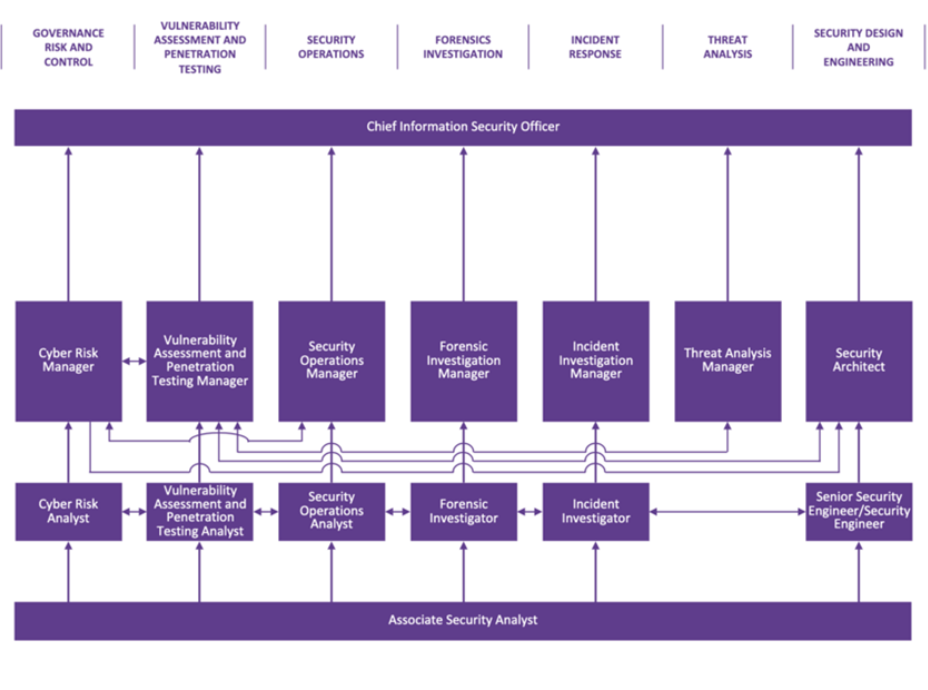El campo de la ciberseguridad ofrece un amplio abanico de oportunidades a los profesionales de la tecnología. Desde el análisis de malware hasta la gestión de una división de ciberdefensores, una carrera en ciberseguridad te mantendrá en pie durante décadas.
La dependencia de las empresas de la tecnología se ha acelerado enormemente debido a la pandemia. Los datos importantes flotan en una nube a la que cualquiera puede acceder en segundos desde cualquier lugar. La conectividad entre equipos dispersos nunca ha sido mejor. Pero la conexión tiene un coste.
Hackers de cerca y de lejos han aprovechado la conectividad digital para intentar peligrosos ciberataques y ransomware. Los piratas informáticos que roban datos, se infiltran en las redes y comprometen los sistemas causan miles de millones de dólares en daños anualmente.
¿Puede el mundo detener a los hackers? Ahí es donde entra en juego el sector de la ciberseguridad para salvar el día. El sector de la ciberseguridad está formado por multitud de puestos, cada uno de ellos con competencias y responsabilidades especiales.
Todos los profesionales de la ciberseguridad, desde el ciberanalista principiante hasta el Director de Seguridad de la Información (CISO), contribuyen a la lucha y la defensa contra los piratas informáticos en todo el mundo.
Las carreras en ciberseguridad ofrecen un viaje apasionante y una gratificante compensación de por vida. Siempre hay más hackers a los que enfrentarse y más retos que superar.
Ciberanalistas y jefes de equipo
Un recién graduado de un programa de TI suele empezar como Analista del Centro de Operaciones de Seguridad (SOC). Este puesto implica trabajar en colaboración con otros analistas del SOC para identificar y neutralizar incidentes de ciberseguridad.
Además, los analistas SOC realizan análisis de amenazas y vulnerabilidades para encontrar áreas de mejora dentro de la infraestructura de TI de una organización. Encontrar y eliminar constantemente puntos débiles disminuye las posibilidades de que los piratas informáticos penetren en la infraestructura informática de las empresas.
Los profesionales de Ciberanálisis y SOC deben prestar mucha atención a los detalles y mantener la calma bajo presión. Este puesto también es dinámico, ya que los problemas a los que se enfrenta un analista cibernético a diario cambian.
Un ciberequipo suele estar dirigido por un jefe de equipo. Suele ser el que más experiencia cibernética tiene y depende de la dirección. Dirigir un equipo requiere dotes de gestión, un gran sentido de la colaboración y la capacidad de trabajar con personas de distintas procedencias.
Especializaciones en ciberseguridad
Los analistas SOC pueden acumular una experiencia diversa en su puesto durante muchos años. Sin embargo, algunos consideran que asumir más concentraciones cibernéticas es útil para obtener una perspectiva más amplia y progresar a niveles de gestión.
Una de estas especializaciones en ciberseguridad es la de investigador ciberforense. En las operaciones delictivas a gran escala, los investigadores son los ciberprofesionales que cuentan con las competencias necesarias para descubrir, analizar y evitar que se repitan este tipo de ataques.
A medida que los investigadores ciberforenses adquieren experiencia, pueden subir de nivel y encargarse de complejos análisis de inteligencia y malware.
Un investigador ciberforense se ocupa de los delitos a posteriori. Los cazadores cibernéticos, en cambio, se especializan en el análisis cibernético preventivo, deteniendo los ataques incluso antes de que se produzcan. Los Cyber Hunters piensan desde la perspectiva de un hacker para determinar dónde se pueden encontrar los puntos débiles.
El análisis de malware es otra especialización. Este sector implica profundizar en los virus, troyanos y ransomware descubiertos. Cada tipo de malware tiene características únicas que pueden diseccionarse. Aprender cómo ataca un malware permite al equipo cibernético formular un plan que lo combata, reforzando la infraestructura general de TI.
Otro subconjunto de funciones cibernéticas incluye a los probadores de penetración, los ingenieros sociales y los especialistas en sistemas de control industrial.
Las pruebas de penetración son una medida aplicada por especialistas en ciberseguridad para poner a prueba el sistema informático de una empresa. Mediante la simulación de un ataque a gran escala, las empresas pueden descubrir si existe alguna vulnerabilidad en el software, las API, el frontend o los servidores backend. Las pruebas muestran dónde y cómo pueden penetrar los hackers y causar daños, y permiten al equipo de desarrollo mejorar la seguridad de las aplicaciones.
La ingeniería social es un ataque informático único. En lugar de un virus o malware, la gente puede coaccionar a otras personas para entrar en un sistema informático específico. La forma más popular de ingeniería social contra las empresas es el phishing.
El phishing consiste en que los piratas informáticos envían correos electrónicos, mensajes de texto o llamadas telefónicas haciéndose pasar por una fuente de confianza, como un banco, una oficina gubernamental o incluso un alto directivo, y solicitan información confidencial, como números de la seguridad social, contraseñas o datos de contratación.
Algunos ciberprofesionales están formados en técnicas de ingeniería social y pueden aplicar medidas preventivas para combatir este tipo único de amenaza.
Por último, los ciberprofesionales pueden concentrar sus esfuerzos en prevenir los ciberataques contra los sistemas de control industrial. Los sistemas de control industrial son procesos a gran escala que incluyen la fabricación y la creación de productos.
Fabricar artículos a gran escala nunca ha sido tan fácil gracias a la automatización y la IA. Los especialistas en sistemas de control industrial garantizan que los sistemas de producción y automoción de las fábricas funcionen de forma eficiente y segura, sin interrupciones por parte de hackers y estados hostiles.

Funciones cibernéticas de alto nivel
Con años de experiencia en la lucha contra ataques de malware, muchos especialistas en ciberseguridad pasan a desempeñar funciones cibernéticas ejecutivas.
Funciones como gerente, director o vicepresidente de seguridad de la información o ciberseguridad, dirigir equipos y operaciones, asumir la responsabilidad de retos complejos y rendir cuentas a los directores de información (CIO) o directores de seguridad de la información (CISO).
Los dos puestos de liderazgo más comunes a los que aspiran los ciberprofesionales son el de Director de Información (CIO) y el de Director de Seguridad de la Información (CISO). Los puestos se solapan, pero ambos tienen funciones algo diferentes.
El CIO trabaja para crear estrategias e iniciativas eficaces dentro de una empresa para mejorar la infraestructura informática y la gestión de datos. El CISO, que a veces depende del CIO, se ocupa de la seguridad, la protección y el mantenimiento de la información, los datos y otros activos digitales. Tanto el CIO como el CISO tienen grandes conocimientos de ciberseguridad y una gran perspicacia empresarial.
Ha llegado el momento
El sector tecnológico solía exigir títulos académicos para entrar en el campo de la ciberseguridad. Sin embargo, la rápida digitalización ha hecho que la ciberseguridad demuestre una de las mayores carencias de mano de obra del mundo.
¿Qué significa esto? Ahora es el momento perfecto para entrar en el mundo de la ciberseguridad. Cuando un estudiante se gradúa en un programa de ciberseguridad para principiantes, no solo tiene una serie de competencias básicas, sino que ahora puede elevar su posición a través de especialidades cibernéticas.
Wawiwa Tech ofrece dos programas de Especialista en Ciberseguridad de nivel inicial para personas con o sin formación informática. Cursos de perfeccionamiento más cortos en todos también están disponibles las especialidades antes mencionadas: investigador ciberforense, cazador de inteligencia sobre ciberamenazas, analista de malware, probador de penetración y especialista en sistemas de control industrial.
A medida que más ciberanalistas entren en este campo y acaben ascendiendo a CISO, nos dirigiremos hacia un futuro más brillante y una Internet más segura para todos.



